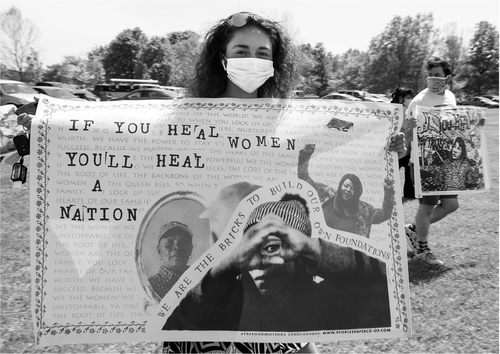Women of Color’s Reproductive Perils Reproduced

Last year, whistleblower Dawn Wooten decried alleged conditions and medical malpractice at Georgia’s Irwin County ICE Detention Center. Days after her claims of mass hysterectomies and questionable COVID-19 procedures, 160 congressmen called for an investigation, according to Democracy Now and National Public Radio reports. However, initial news coverage suggests ICE has only confirmed two cases of medical malpractice. Follow-up reports in November stated that at least 43 women, most of whom are Black and Latinx, had alleged undergoing unnecessary gynecological procedures. Advocacy organizations and media later revealed that following the investigation launched by the Department of Homeland Security’s Office of the Inspector General, they also initiated action to deport various women involved in the claims. Orders to deport these women appear to be retaliation and a dismissive approach to protections provided via U-visas intended for individuals who serve as key witnesses in investigations.
The situation at Irwin County Detention Center urges us to think about human rights and transparency in carceral systems. These alleged reproductive malpractices underscore the dehumanization, threat of medical experimentation, and abuse women of color face in these spaces. Racist “welfare queen” stereotypes depicting women of color as inferior, unfit to have children, or to be a financial burden to society were the rationales used to justify these heinous sterilization practices.
Subsequently, these racist ideologies, created under the guise of science, are often translated into federal policies that disproportionally oppress the reproductive rights of women of color. For example, like the controversial Hyde Amendment that would ultimately remove coverage for abortions under government insurance programs and more recent state-specific abortion bands [see, American Civil Liberties Union (ACLU)].
Moreover, ICE facilities increasingly have private-for-profit management that aims to minimize institutional costs and regulations. Consequently, a 2020 ACLU research report confirms that 81 percent of detained immigrants reside in privately operated detention centers that are not subject to CDC health regulations and reporting. As a result, women at ICE detention centers face unsanitary environments, medical neglect, and limited access to reproductive health services.

These claims uncover persisting racist practices. History has shown, and recent accounts show us patterns of scientific abuse and sterilization of women in poor, Black, indigenous, and Brown communities. However, information on the medical practices that transpire at ICE detention centers is barely known. For example, a landmark study by Carolyn Sufrin in 2019 documented the number of pregnant women in prison and their health outcomes, for the first time in carceral history. However, unfortunately, this information is still not available to access from ICE centers, which speaks to the marginalization, neglect, and lack of accountability that has been taken at these facilities. While watchdog organizations attempt to monitor prisons, advocacy organizations confront scarce information on those detained in the U.S. immigration detention system, the largest of these mass incarceration systems in the world.
Freedom for Immigrants reports that the top complaint they receive is on medical issues. The data collected by Syracuse University’s TRAC Immigration database indicate that, as of June 2019, there were at least 4,524 women detained at ICE facilities. With less visibility and oversight, abusive practices in carceral systems often come to light after a person has been harmed or even dies. For example, in 2013, an NBC investigative report found that from 2006-2010, California prisons had performed 150 hysterectomies or tubal ligations that were coercive, lacked state authorization, or lacked informed consent. The report also claims that there are still 100 more procedures in question dating back to 1997. Thus, we cannot assume ICE facilities are exempt or that those detained are not vulnerable to medical malpractice and other human rights violations.
The acts allegedly committed by the ICE physician in question, whom Wooten and the women at Irwin Detention Center called “the uterus collector,” signals a perpetuation of the historical accounts of racist medicine rooted in eugenicist ideas. Medical research has expanded the berth of scientific knowledge through experimentation on Black women. If ICE medical staff are performing questionable hysterectomies without informed consent or warranted health concerns, these practices echo the past sterilization practices in the U.S. against Black and Brown women.

The scholarship of Dorothy Roberts and Harriet Washington document the gynecological advances produced through involuntary, unsanitary, and unsafe procedures performed on enslaved Black women. Instead of being denounced for their exploitation of Black women’s bodies, these physicians were considered pioneers of gynecology. These include coercive mass sterilization programs led by eugenicists in the past, which have disproportionately impacted women of color, including the Mississippi Appendectomies and “La Operación” in Puerto Rico. Physicians at contemporary ICE detention centers may operate under some of these eugenic beliefs. Practices based on such beliefs continue to violate women’s reproductive rights, especially those whose immigration status compromises their freedoms and human rights. There is an urgent need for more patient safety measures and accountability from ICE medical personnel and administration.
Despite ethical review boards and constitutional mandates that should protect inmates, this latest case demonstrates that past forms of racialized social control and abuses of women’s bodies persist. Consequently, these mandates continue to dehumanize people with multiple marginalized identities. With the U.S. presidential election following these accusations, media attention dwindled regarding the status of abuse investigations and the state of the women involved. However, towards the end of November, U.S. government officials were asked to halt deportation for the women at the ICE facility, where the alleged abuse occurred.
Perhaps the Biden administration will take further action towards protecting immigrants from arrest, removal, and unsafe medical practices if detained. However, recently there has been controversy over the credibility of plans announced by the Biden administration to decrease the 289 families being detained together at ICE detention centers. Moreover, there are ethical concerns around the privatization of detention centers and the urgency for improving and standardizing patient rights, medical practices, reporting, and record-keeping across carceral systems that require serious attention.
Although the government announced that the Irwin ICE Detention center would be closing in September there are still unanswered questions on the safety of women’s healthcare practices and the threat of recurring violations. Government and privately managed ICE facilities need the following to protect the health and reproductive rights of women:
- Follow-up investigations for all ICE detention centers on past medical practices.
- Improved mechanisms of oversight and transparency including:
- Updated online dashboard for people detained
- Monitoring of health personnel
- Cost of medical procedure in both public and private centers
- Monthly to quarterly reports to the government on the health status, medical services, and procedures performed on those detained.
- The release of vulnerable groups during the current COVID-19 pandemic, especially pregnant women.
- Clear communication with women regarding their patient rights and of any administered procedure or treatment.
- An external ethical committee that evaluates and monitors all requested or scheduled surgeries that may lead to sterilization.
How long will we perpetuate this cycle of dehumanizing Black and Brown women under assumed grand ideals of justice? Policy change must consist of intentional, inclusive, and equitable measures that translate into eliminating harmful, racist, and anti-immigrant institutional practices.

